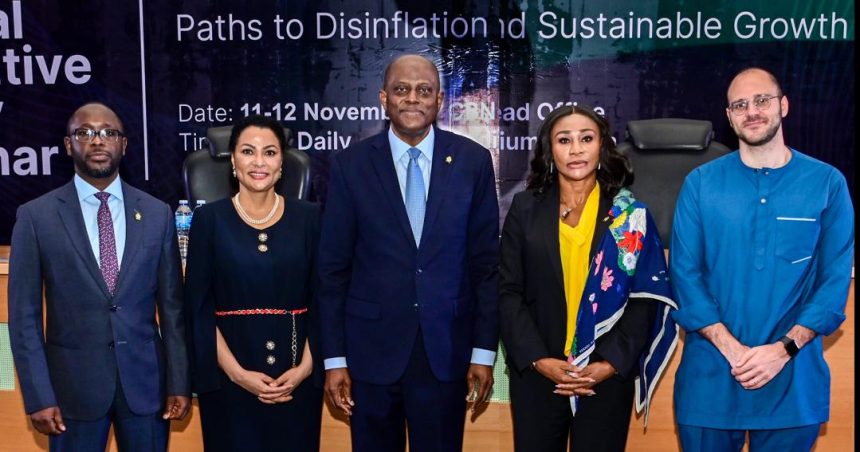FG, CBN Launch Strategy to Hit 7% Growth, Single-Digit Inflation
By Patience Ikpeme
The Federal Government and the Central Bank of Nigeria (CBN) have introduced a new framework, the Dis-Inflation and Growth Acceleration Strategy (DGAS), aimed at unifying fiscal and monetary policies to achieve sustained economic expansion above 7% while simultaneously bringing inflation down to single digits.
Speaking at the 2025 Annual Executive Policy Seminar on Tuesday, Dr. Doris Uzoka-Anite, Minister of State for Finance, explained that the traditional methods of monetary tightening or fiscal expansion alone are insufficient to address the nation’s challenges.
“What Nigeria needs at this stage is a unified national framework that integrates both monetary and fiscal levers to drive non-inflationary growth and structural transformation,” Dr. Uzoka-Anite said.
The Minister revealed that the DGAS document was co-created by the Ministry of Finance and the CBN, serving as the second wave of reforms following the administration’s actions on energy pricing and foreign exchange liberalization. The goal is to accelerate the timeline for achieving objectives such as doubling national and household income and reducing poverty.
The core objective of DGAS, the Minister noted, is to achieve sustained GDP growth above 7% while steadily bringing inflation back to single digits. This will be achieved through supply-side expansion rather than demand suppression.
“The core objective of DGAS is simple but profound, to achieve sustained GDP growth above 7% while steadily bringing inflation back to single digits through supply-side expansion rather than demand suppression,” she stated.
The DGAS proposes a single window execution platform to unify policy coordination, capital mobilization, and project incubation. This platform would work directly with the CBN and the Ministry of Finance, ensuring that monetary policy incentives reinforce fiscal measures aimed at industrial expansion.
The strategy is built on nine coordinated pillars. Firstly, there is Capital Mobilization and Financial Innovation, which involves creating a development finance framework that can pool domestic and international long-term funding through instruments like dual-stakeholding diaspora funds and private equity architecture. Secondly, in the area of industrial capacity, the framework focuses on securing Nigeria’s cost structure.
Dr. Uzoka-Anite said: “If we replicate the Dangote refinery story in multiple sectors from agriculture to mining to healthcare, it will result in sharp rises in job creation, tax earnings and wealth transfers to households, investors and entrepreneurs.”
Thirdly, Energy Expansion prioritizes increasing and maximizing all energy resources—oil, gas, hydro, solar, and emerging fuels—to power the new industrial revolution through enhanced generation, transmission, and distribution capacities. Fourthly, Human Capital sets a target to enroll over 10 million young Nigerians annually in technical, vocational, and device-linked programs tied directly to priority sectors. Fifthly, Consumer Credit focuses on expanding the consumer credit platform so citizens can access structured financing for housing, education, healthcare, and manufactured goods to deepen domestic demand. Sixthly, Regulatory Alignment is key, with an estimation that at least 40% of existing rules and regulations can be stripped out of the system, accelerating GDP growth by at least 2-3% per annum by removing regulatory friction.
CBN Governor Mr. Olayemi Cardoso spoke in support of the DGAS framework, stressing the necessity of maintaining price stability and predictability to attract investment.
“I’m a very strong believer in something, and that is, once you get these fundamentals right, and you’re doing the right things, you don’t have to make anybody come and invest. Investors naturally get attracted to such environments,” Mr. Cardoso said.
The Governor confirmed that the Bank’s core focus is price stability, advancing Nigeria’s policy framework through inflation targeting to enhance predictability and guide market expectations. He noted that collaboration with fiscal authorities to reduce costs and incentivize production remains a key imperative.
Mr. Cardoso also addressed institutional reforms within the CBN, including new staff mobility policies designed to ensure senior management have broad experience across the federation. He also called for greater transparency and less interference from stakeholders.
He said the CBN is moving away from a culture where, “You would not have to know the government You would not have to know the governor You would not have to know the DGs You would not have to know the directors.”
He concluded with a stern warning against repeating past fiscal errors, specifically citing the Ways and Means policy.
“A situation where we had frightening, very frightening ways and means to GDP ratios should never happen,” he cautioned. “Where interventions flew all over the place with no results.”




